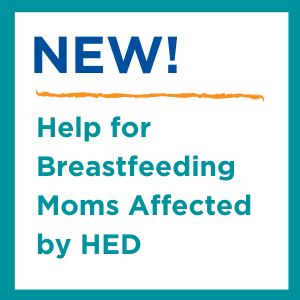Congenital absence of the breasts and/or nipples is extremely rare in the general population. The National Foundation for Ectodermal Dysplasias first surveyed women about breast issues in ectodermal dysplasias in the late 2000s.
Our survey showed a fairly high rate of congenital abnormalities of the nipples and absent or underdevelopment of one or both breasts at puberty in our respondents, with the majority of affected women having hypohidrotic ectodermal dysplasia (HED).
Further research findings from Wahlbuhl-Becker, et al. documented in 2017 how HED can impact breast development in women. These breast changes can lead to women having difficulty in breastfeeding their babies.
Two New Resources
Not all women who are carriers of HED may realize that they could face challenges should they choose to breastfeed. We have created two new resources to help you. The first is a fact sheet you can download that explains the different ways HED affects the breasts, what that means for breastfeeding and ways to find support.
The second fact sheet is for you to share with your doctors, nurses and/or lactation specialists. Many of them may not be familiar with the condition nor know the special challenges you face because of HED. This article explains the range of symptoms you might have and suggests ways for how they can assist you.
Download Hypohidrotic Ectodermal Dysplasia: A Resource for Care ProvidersOther Breast Resources
You can read more about breastfeeding complications in HED. This blog goes into the research findings and shares several women’s experiences with breastfeeding.
Learning more about breast development and ectodermal dysplasias can help you consider treatment options and how to discuss the issue with your child, if she is the one who is a carrier of HED.
Because ectodermal dysplasia can cause the breast to be small or absent, some women have elected to get breast implants. You can read the stories of several women’s decisions on whether or not to get breast implants. In a recent blog, Seeing Myself as Beautiful, Nicole Fitzgerald bravely shares her story about choosing to get breast implants and how that made her feel as a woman.
Finding Support from Other Women with HED
Having challenges with breastfeeding can be emotional and frustrating for a new mom. You can find support from the wonderful women in our private Facebook group. It’s a safe place filled with other women who understand.
Join Ectodermal Dysplasia – Adult Women’s GroupWe hope that these new resources will help you prepare and have a positive experience should you choose to breastfeed!
